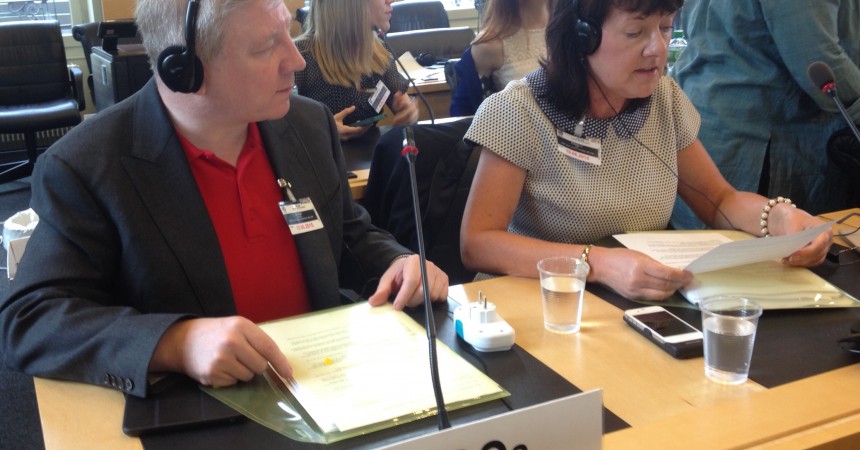 Atheist Ireland welcomes the conclusions today from the UN Committee on the Rights of the Child that Ireland should significantly increase the availability of non-denominational or multi-denominational schools, eliminate discrimination in school admissions including by amending the Equal Status Act, and ensure accessible options for children to opt-out of religious classes.
Atheist Ireland welcomes the conclusions today from the UN Committee on the Rights of the Child that Ireland should significantly increase the availability of non-denominational or multi-denominational schools, eliminate discrimination in school admissions including by amending the Equal Status Act, and ensure accessible options for children to opt-out of religious classes.
Atheist Ireland was in Geneva in January when the UN Committee was questioning Ireland, and we highlighted the State’s attempt to mislead the Committee about the Minister for Eduction’s intentions to change the Equal Status Act. We are therefore particularly pleased that the Committee has specifically called for changes to the Equal Status Act.
Atheist Ireland has for years been briefing and attending meetings of United Nations, Council of Europe and OSCE human rights bodies about the need for secular education. This is the ninth set of conclusions from such bodies in the past decade that vindicate Atheist Ireland’s education policy, the Schools Equality PACT. PACT is an acronym for Patronage, Access, Curriculum and Teaching.
- Here is the UN document released today
- Here is how Ireland tried to mislead the UN Committee
- Here is Atheist Ireland’s Education Policy
Here are the relevant conclusions of the UN Committee regarding freedom of thought, conscience and religion, education and respect for the views of the child.
Freedom of thought, conscience and religion
35 The Committee is concerned that children are not ensured the right to effectively opt-out of religious classes and access appropriate alternatives to such classes. The Committee recommends that the State party ensure accessible options for children to opt-out of religious classes and access appropriate alternatives to such classes, in accordance with the needs of children of minority faith or non-faith backgrounds.
Education
63 The Committee welcomes the establishment of the Forum on Pluralism and Patronage in the Private Sector to attempt addressing the need for diversity in the types of schools available to children in the State party. However, the Committee remains concerned at the very small number of non-denominational schools. The Committee is also concerned about:
(a) Schools continuing to practise discriminatory admissions policies on the basis of the child’s religion and/or whether his or her parent(s) are former students of the school;
(b) Incomplete complaints-handling structures in the education sector;
64 The Committee recommends that the State party: (a) Expeditiously undertake concrete measures to significantly increase the availability of non-denominational or multi-denominational schools and to amend the existing legislative framework to eliminate discrimination in school admissions, including the Equal Status Act; (b) Establish an effective complaints mechanism for students in schools;
Respect for the views of the child
32 In the light of its general comment No. 12 (2009) on the right of the child to be heard, the Committee recommends that the State party: (c) Ensure that the Education Act is amended to ensure the right of the child to be heard in individual cases;.
Brilliant piece of work AI. Congratulations!
What do you think about B26? “The Committee recommends that the State party expeditiously amend its Family Law Act to remove all exceptions to the minimum age of marriage being 18 years.”
Even with parental consent?
Thanks, Tina. I’m not sure about the minimum marriage age. Any age cut-off will of course be arbitrary at the point of application. I think there is a fair argument for a maturity-based cut-off for young people entering into major long-term commitments. In reality, people younger than the cut-off age can and do choose to live together anyway.
I’d be pretty astonished if my (17yr old) decided to marry though I don’t know that I’d forbid it in law. Do they expect to run that standard cross culturally I wonder.
@MN & Atheist Ireland
Well done guys! Keep their toes to the fire.
I’m guessing ‘exceptions’ are religious exceptions.
My feelings on religious exceptions are there should be none. If your religion allows or forbids something that belief shouldn’t have legal endorsement. I can’t see a justifiable reason to allow 16 year olds to marry if their religion permits it but the law prohibits it for others. If you believe 16 year olds should marry them a secular case should be made for that.
Is any of this binding?
I’m conflicted. I sort of believe in sovereignty, yet I don’t when it comes to basic human rights.
Please keep up the work. This is among the most valuable work you can possibly do. I’m not from the evangelic strain of atheism, but I strongly believe in and support all efforts to lead to a more secular society and the elimination of discriminatory practices.